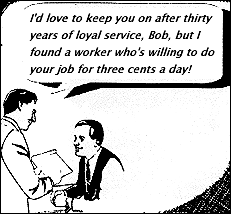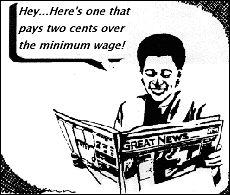Steve Cowan – 27/6/98
 |
The National-NZ First coalition have recently launched what is likely to be just the
first of many attacks on beneficiaries. In the gun first are the unemployed; as from October unemployed people will be forced into ‘community work’ for twenty hours a week. They will receive a token $21 for this work.
The Minister of Employment Peter McCardle has attempted to dress up the attack as a way of ‘helping’ the unemployed maintain their ‘work ethic’ and give them ‘self-respect’. As the Sunday Star-Times rightly observed, ‘This is the lance-corporal’s approach to war. Keeping the powder dry and troops fighting fit. It’s not an approach that will actually avert the war. Or win it. It will just keep the cannon fodder in top shape for whatever comes next.’
The obvious implication of McCardle’s approach is that the jobless lie around in bed all day, then pop down to the pub for a night of debauchery. It’s just another way of scapegoating the jobless. What’s really happening is that the government is deliberately moving away from the notion of a welfare state for all, to a safety net for the ‘deserving poor’ allowing the scapegoating of the ‘undeserving’ and ultimately the reduction of welfare services.
What is all the more hypocritical about McCardle’s comments is that he is a member of a government which has, along with all governments since 1984, prioritised inflation reduction over the maintenance of full employment. Permanent poverty has been accepted as an ‘inevitable’ feature of our brave new free-market world. (Treasury officials talk about a ‘natural rate of unemployment’).
 |
Since 1984 Labour, National and coalition governments alike have remained wedded to monetarist economic policies. According to their theory reduced inflation, reduced taxation, reduced social spending and deregulation would lead to significant economic growth and substantially lower unemployment. But it’s all been a mighty, unmitigated disaster. The theories haven’t worked. Everyone knows it – except for most politicians, most economists, most journalists, and the men in corporate boardrooms.
Look at the figures. In the period 1960-74 the GDP growth rate was 4.1%. From 1975 to 1985 it had slumped to 1.83%. And in the period 1986 to 1994 (when the monetarist economic policies really kicked in) it had fallen to 1.77%.
As Auckland academic and writer Jane Kelsey writes in her excellent book The NZ Experiment, ‘New Zealand spent almost seven years of the (post 1984) experiment in stagnation and recession. The average growth across OECD countries in the period 1985-92 was 20%. The New Zealand economy shrank by 1%’.
What has this all meant for unemployment? Well, in the period 1969-74 the unemployment rate was only 0.17%. In the period 1986-1994 when Roger Douglas and Ruth Richardson were ravaging the country, unemployment shot up to 9.9%.
There was a brief economic upturn in 1995 and the unemployment rate dipped to 6.3% (the lowest level since December 1988) but it was still three times higher than in 1985 when the Labour Government held an employment promotion conference to discuss the unemployment crisis.
But the jobless figures have continued to rise since then and its estimated by most commentators that it will continue in the 7-8% range for the foreseeable future.
And it should also be remembered the official statistics are conservative. Stricter eligibility criteria and people shifting on to other form of benefits, for example, have helped to conceal the true rate of unemployment.
In the short-term the picture is also bleak. A recent National Bank bulletin reported that one in ten firms plan to shed staff this year – the worst employment outlook in some twenty years.
Even the National Business Review, a strong advocate of free market policies admitted in its April 24 issue that the economy looked like it was heading into recession.
In the same week a report on the New Zealand economy by the Organisation for Economic Cooperation and Development (OECD) stated that during the past seven years the economy had barely been able to maintain an adequate standard of living for the New Zealand population. But for the tens of thousands of people out of work, their standard of living has already gone through the floor.
This government – still zealously following failed economic policies – has no real answers to the unemployment crisis. Instead it’s out to bash the unemployed again, forcing them into working for nothing. It’s getting worse for the jobless and it’s not over yet. Next up watch the government wield the big stick across the backs of those receiving the sickness, invalids and domestic purposes benefits.
If we are serious about doing something about unemployment – about creating real jobs – then it’s time for fundamental changes in economic policies. We’ve had over twelve years of new right economic policies that have destroyed people’s lives and their futures. No government should have the power to force people into permanent poverty.
We need a government that has a commitment to a full employment policy. Governments should exist to serve the people, not to implement and perpetuate failed and discredited free market policies.
This article and grahics are reprinted from Presto magazine (available on dead tree in Christchurch) with permission.




